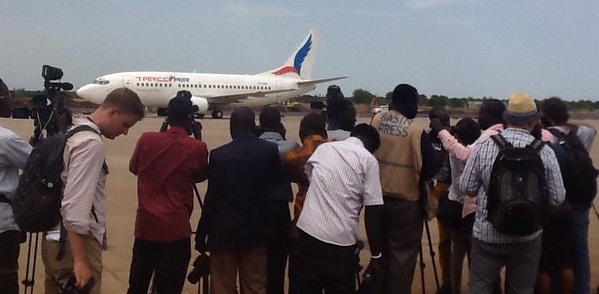********
MACHAR’S TOP GENERAL ARRIVES DAY BEFORE
SPLM-IO CHIEF EXPTECTED
Juba: April 26, 2.30pm
Sources: RIEK MACHAR has now boarded the UNMISS aircraft at Gambela Airport, en route to Juba.
— Allan Olingo (@allanolingo) April 26, 2016
Juba, South Sudan | AFP
After a weeklong delay, South Sudan rebel chief Riek Machar is finally expected back in Juba on Tuesday to join a unity government being formed to end more than two years of civil war.
A rebel statement said Machar, who is to be sworn in as first vice-president alongside his longtime arch rival, President Salva Kiir, “will be arriving today in Juba April 26, 2016”.
He was expected to land anytime after 4 pm (1300 GMT), depending on the weather and flight operations, said spokesman William Ezekiel.

Machar, who was originally due back in the city on April 18 under a peace deal, is expected to head immediately from the airport to the presidential palace to be sworn in.
His delayed arrival infuriated the international community after the months of negotiations spent on getting the rivals to return to the same city and share power in the world’s newest country.
Ensuring they work together in a unity government, and that the thousands of rival armed forces now in separate camps inside the capital keep their guns quiet, will be an even bigger challenge.
Top rebel military commander Simon Gatwech Dual returned this Monday, in a key step forward in the floundering peace process.
“We are one South Sudan,” Dual shouted, waving a walking stick in the air as he marched off the plane.
He was welcomed by top government army commanders, surrounded by heavily armed troops from both the government and rebels.

Deep suspicion
Both sides remain deeply suspicious, and fighting continues with multiple militia forces unleashed who now pay no heed to either Kiir or Machar.
His return was stalled by arguments that at one point, in a country awash with weapons, came down to the a dispute about just over two dozen rocket-propelled grenades and machine guns that the force guarding Machar are allowed to have.
Tens of thousands of people have been killed and more than two million driven from their homes in the conflict, which has reignited ethnic divisions and been characterised by gross human rights abuses.
The economy is in ruins, over five million people need aid and two million have fled their homes.
Over 180,000 people are crammed into UN peacekeeping camps across the country, too terrified to venture outside the razor wire fences for fear of being killed.
Tensions are high, and the days ahead will be critical.
“We need the guns to stay silent and give people time — both as official warring parties and as individuals — with one another in coming days,” said Casie Copeland from the International Crisis Group (ICG) think tank.
Suffering is on an epic scale. Parts of the country, especially the devastated oil producing northern Unity region, have been pushed to the brink of famine.
There are huge expectations Machar’s arrival means the myriad of problems will be solved swiftly — but there will be no quick fix.
‘Best Chance yet’
Diplomats note gloomily that while Machar’s return is the “best chance yet”, the deal imposed under intense international pressure only sees the country go back to the status quo that existed before his July 2013 sacking as vice president that precipitated the war.
The agreement has already been repeatedly broken with months of fighting since it was signed, and its key power sharing formula in ruins after Kiir nearly tripled the number of regional states.
South Sudan’s civil war began in December 2013 when Kiir accused Machar of plotting a coup. The conflict has torn open ethnic divisions and been characterised by human rights violations.
It has included the abduction and rape of thousands of women and girls, massacres of civilians, recruitment of child soldiers, murder, mutilation and even cannibalism.
South Sudan is one of poorest countries on the planet, and had some world’s worst indicators for development, health and education even before over two years of war.
Machar has over 1,500 armed troops in the capital, while government forces have officially just over double that.
All other soldiers have to remain at least 25 kilometres (15 miles) outside the capital.
The threat of violence at a local level remains enormous, with multiple militia forces unleashed and out of control.
Machar and Kiir are decades-old rivals and even if they can work together both must also rein in powerful hardline field commanders.
 The Independent Uganda: You get the Truth we Pay the Price
The Independent Uganda: You get the Truth we Pay the Price



